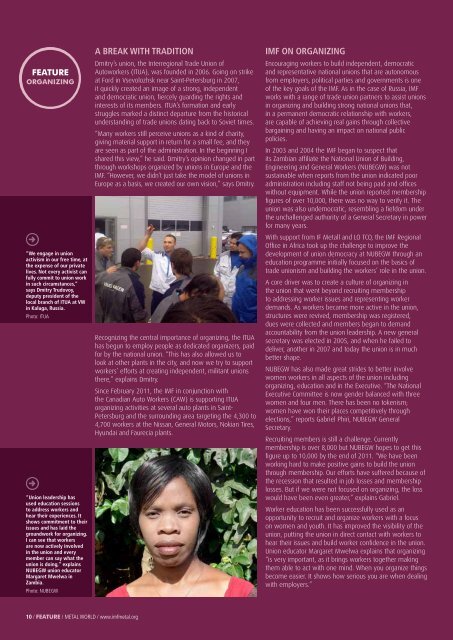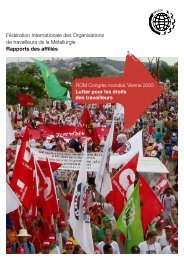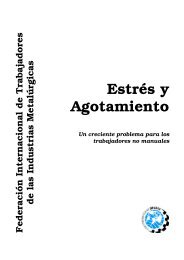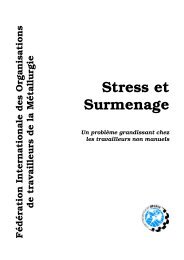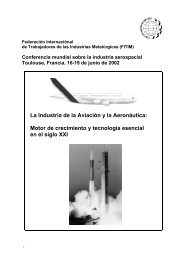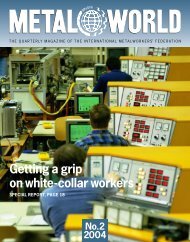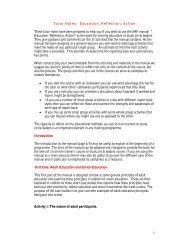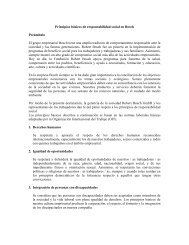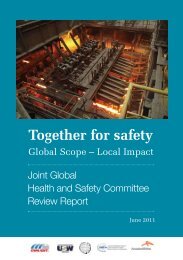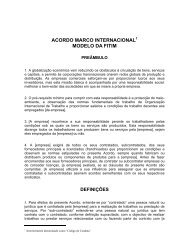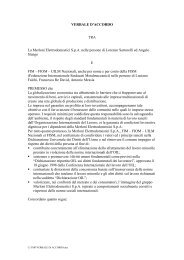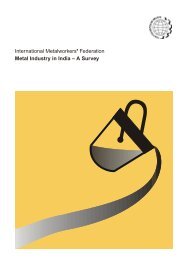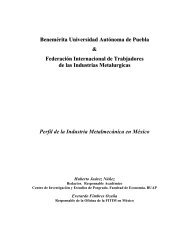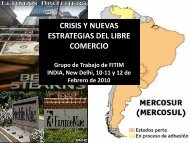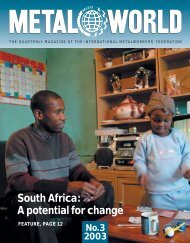Metal World 1 2011 - International Metalworkers' Federation
Metal World 1 2011 - International Metalworkers' Federation
Metal World 1 2011 - International Metalworkers' Federation
You also want an ePaper? Increase the reach of your titles
YUMPU automatically turns print PDFs into web optimized ePapers that Google loves.
FEATURE<br />
ORGANIZING<br />
“We engage in union<br />
activism in our free time, at<br />
the expense of our private<br />
lives. Not every activist can<br />
fully commit to union work<br />
in such circumstances,”<br />
says Dmitry Trudovoy,<br />
deputy president of the<br />
local branch of ITuA at VW<br />
in Kaluga, Russia.<br />
Photo: ItUa<br />
“union leadership has<br />
used education sessions<br />
to address workers and<br />
hear their experiences. It<br />
shows commitment to their<br />
issues and has laid the<br />
groundwork for organizing.<br />
I can see that workers<br />
are now actively involved<br />
in the union and every<br />
member can say what the<br />
union is doing,” explains<br />
NuBEGW union educator<br />
Margaret Mwelwa in<br />
Zambia.<br />
Photo: NUBeGW<br />
10 / FeatUre / <strong>Metal</strong> <strong>World</strong> / www.imfmetal.org<br />
A BREAK WITH TRADITION<br />
Dmitry’s union, the Interregional Trade Union of<br />
Autoworkers (ITUA), was founded in 2006. Going on strike<br />
at Ford in Vsevolozhsk near Saint-Petersburg in 2007,<br />
it quickly created an image of a strong, independent<br />
and democratic union, fiercely guarding the rights and<br />
interests of its members. ITUA’s formation and early<br />
struggles marked a distinct departure from the historical<br />
understanding of trade unions dating back to Soviet times.<br />
“Many workers still perceive unions as a kind of charity,<br />
giving material support in return for a small fee, and they<br />
are seen as part of the administration. In the beginning I<br />
shared this view,” he said. Dmitry’s opinion changed in part<br />
through workshops organized by unions in Europe and the<br />
IMF. “However, we didn’t just take the model of unions in<br />
Europe as a basis, we created our own vision,” says Dmitry.<br />
Recognizing the central importance of organizing, the ITUA<br />
has begun to employ people as dedicated organizers, paid<br />
for by the national union. “This has also allowed us to<br />
look at other plants in the city, and now we try to support<br />
workers’ efforts at creating independent, militant unions<br />
there,” explains Dmitry.<br />
Since February <strong>2011</strong>, the IMF in conjunction with<br />
the Canadian Auto Workers (CAW) is supporting ITUA<br />
organizing activities at several auto plants in Saint-<br />
Petersburg and the surrounding area targeting the 4,300 to<br />
4,700 workers at the Nissan, General Motors, Nokian Tires,<br />
Hyundai and Faurecia plants.<br />
IMF ON ORGANIZING<br />
Encouraging workers to build independent, democratic<br />
and representative national unions that are autonomous<br />
from employers, political parties and governments is one<br />
of the key goals of the IMF. As in the case of Russia, IMF<br />
works with a range of trade union partners to assist unions<br />
in organizing and building strong national unions that,<br />
in a permanent democratic relationship with workers,<br />
are capable of achieving real gains through collective<br />
bargaining and having an impact on national public<br />
policies.<br />
In 2003 and 2004 the IMF began to suspect that<br />
its Zambian affiliate the National Union of Building,<br />
Engineering and General Workers (NUBEGW) was not<br />
sustainable when reports from the union indicated poor<br />
administration including staff not being paid and offices<br />
without equipment. While the union reported membership<br />
figures of over 10,000, there was no way to verify it. The<br />
union was also undemocratic, resembling a fiefdom under<br />
the unchallenged authority of a General Secretary in power<br />
for many years.<br />
With support from IF <strong>Metal</strong>l and LO TCO, the IMF Regional<br />
Office in Africa took up the challenge to improve the<br />
development of union democracy at NUBEGW through an<br />
education programme initially focused on the basics of<br />
trade unionism and building the workers’ role in the union.<br />
A core driver was to create a culture of organizing in<br />
the union that went beyond recruiting membership<br />
to addressing worker issues and representing worker<br />
demands. As workers became more active in the union,<br />
structures were revived, membership was registered,<br />
dues were collected and members began to demand<br />
accountability from the union leadership. A new general<br />
secretary was elected in 2005, and when he failed to<br />
deliver, another in 2007 and today the union is in much<br />
better shape.<br />
NUBEGW has also made great strides to better involve<br />
women workers in all aspects of the union including<br />
organizing, education and in the Executive. “The National<br />
Executive Committee is now gender balanced with three<br />
women and four men. There has been no tokenism;<br />
women have won their places competitively through<br />
elections,” reports Gabriel Phiri, NUBEGW General<br />
Secretary.<br />
Recruiting members is still a challenge. Currently<br />
membership is over 8,000 but NUBEGW hopes to get this<br />
figure up to 10,000 by the end of <strong>2011</strong>. “We have been<br />
working hard to make positive gains to build the union<br />
through membership. Our efforts have suffered because of<br />
the recession that resulted in job losses and membership<br />
losses. But if we were not focused on organizing, the loss<br />
would have been even greater,” explains Gabriel.<br />
Worker education has been successfully used as an<br />
opportunity to recruit and organize workers with a focus<br />
on women and youth. It has improved the visibility of the<br />
union, putting the union in direct contact with workers to<br />
hear their issues and build worker confidence in the union.<br />
Union educator Margaret Mwelwa explains that organizing<br />
“is very important, as it brings workers together making<br />
them able to act with one mind. When you organize things<br />
become easier. It shows how serious you are when dealing<br />
with employers.”


